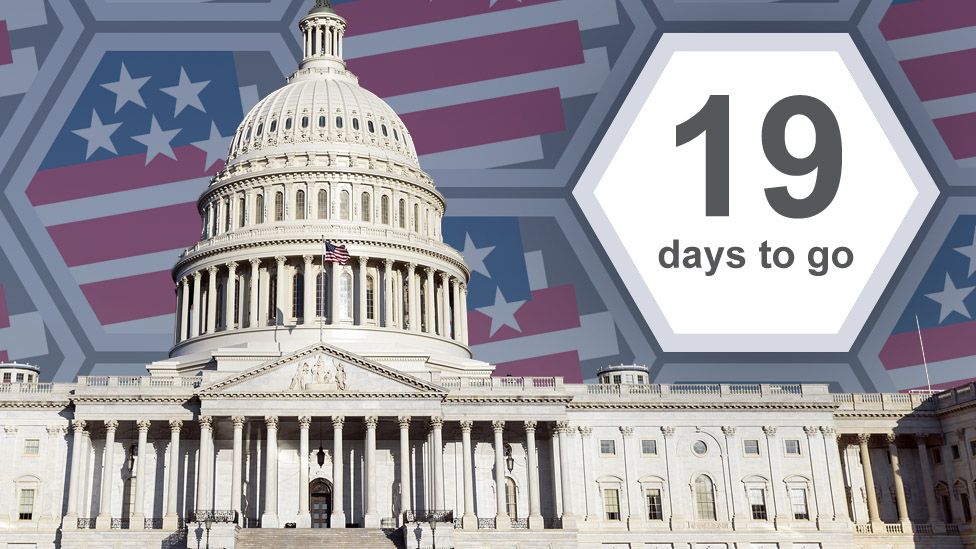Your US mid-term elections daily digest
- Published

The US mid-term elections in just under three weeks' time will help define the rest of Donald Trump's presidency.
Americans will vote for members of both chambers of Congress, as well as for governors in 36 out of 50 states.
Between now and then, we'll bring you updates and all the best analysis every weekday in this round-up.
Today's round-up includes some big, big numbers and the debate on healthcare being placed front and centre.
A few big numbers
One of the big questions this year is whether the trend of low turnout in mid-term elections will be bucked.
We won't have a definite answer until 6 November itself, but we might already be getting a sense that things certainly are different this year.
That's because early voting or mail-only voting has already started in 20 states - and there are some pretty striking numbers coming in.
The office of Georgia's secretary of state says 69,049 people turned up to vote on Monday, the first day they could do so in person. The Atlanta Journal-Constitution reported that some people in Cobb County had to queue for two hours to vote - more than three weeks before the election is held.
Compare that number with the first day of early voting in the last mid-terms in 2014 - only 20,898 people voted then.
The total of people who had voted early in Georgia (by mail or in person) is up 170% on 2014.
There might other factors at play in Georgia - there's a particularly close race for governor between Stacey Abrams (who could become the first black female governor) and Brian Kemp. And as we reported last week, there is real concern over the suppression of the black vote in Georgia.
But what's happening in Georgia is also happening elsewhere - in neighbouring Tennessee, for example.
The Tennessean newspaper reports that in Davidson County (where the state capital Nashville is located), 10,249 people turned up on the first day of early voting on Wednesday.
That's just 2,000 people fewer than turned out on the first day of early voting in the 2016 presidential election. Generally, presidential elections tend to get a significantly higher turnout than mid-terms.
Watch this space.
One quote
One of the biggest disappointments for Republicans so far during President Trump's term in office is their failure to repeal Obamacare.
If they were to lose either of the chambers of Congress on 6 November, they could kiss goodbye to any new attempts to repeal it, as Democrats would almost certainly kick it into the long grass.
Now, Senate majority leader Mitch McConnell has spelled that out, saying repeal would be back on the agenda in 2019 if Republicans held Congress.
In an interview with Reuters, McConnell blamed the healthcare programme, which gives 20m Americans health cover, for the national debt.
This week, it was announced the national budget deficit had risen 17% in one year to $779bn - a six-year high.
"If Republicans retain the Senate they will do everything they can to take away families' health care and raise their costs," Senate Democratic leader Chuck Schumer said in response. "Americans should take Senator McConnell at his word."
One piece to read
As McConnell's comments indicate, the state of healthcare in the US is proving to be one of the most divisive issues on the ballot ahead of the mid-terms, and one both parties have put firmly on the agenda in ads and debates (albeit much more on the Democrats' side, up to now).
The BBC's Ritu Prasad has been to Charleston, West Virginia, to look at why people feel the system is broken - and what politicians say can be done to change it.
- Published16 October 2018
- Published17 October 2018
- Published3 October 2018